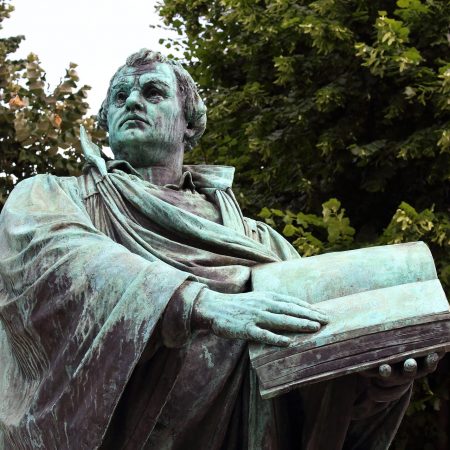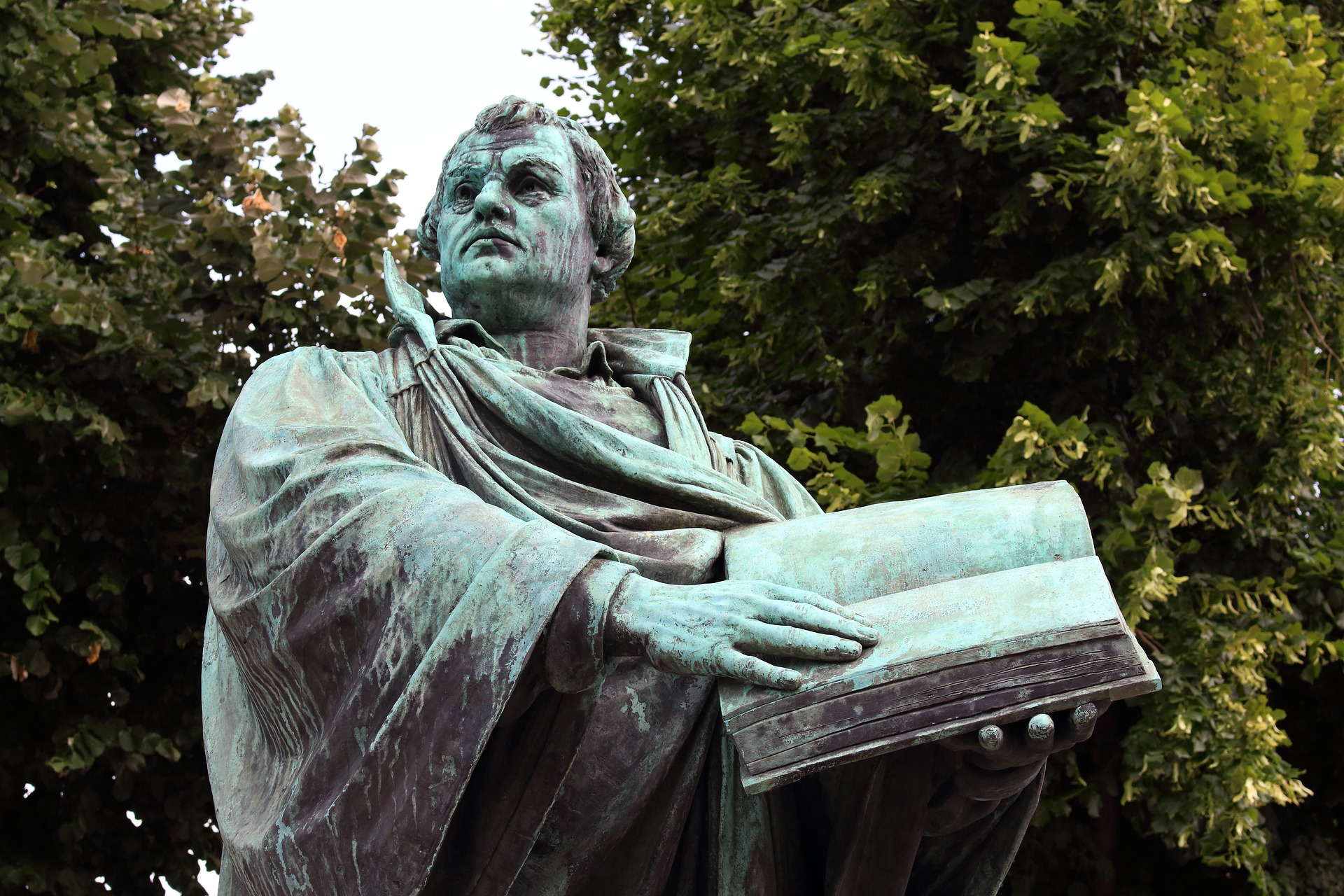
Instead of writing yet another blog about how we Christians should look upon and react to Halloween, how about we use October 31 to consider The Reformation?
As I’m sure the vast majority of you know, the Reformation all started 503 years ago when a German monk named Martin Luther nailed a piece of paper to the doors of All Saint’s Church in Wittenberg, Electorate of Saxony, (Germany) in the Holy Roman Empire.
On that piece of paper were 95 theses, or statements, that Luther sought to debate with other theologians in the church. Many historians and scholars maintain that Luther was not intending to spark a revolution within the church at the time, but primarily to engage in a scholarly, theological discussion on the practice of selling indulgences.
For about two years prior to this (1516-1517), a Dominican friar named Johann Tetzel had been, under papal commission, selling indulgences in Germany to raise money to rebuild St. Peter’s Basilica in Rome.
I’ve long been fascinated by the concept of indulgences. The idea that a contribution to the work of the Lord (in this case rebuilding a church) could reduce one’s time in purgatory seems an alien concept to us now, but at the time was accepted theology. By the late Middle Ages, the sale of indulgences were used to fund charities, including hospitals. Eventually the sale of these elaborate pieces of paper became abused and commercialized. The church had attempted to curb these abuses prior to Martin Luther’s objections, but had not been unsuccessful. Fifty years after Luther nailed his 95 Theses to the door of the church in Wittenberg, the Roman Catholic Church did outlaw the sale of indulgences.
I write none of this to condemn or commend any of the current Christian denominations. To me, the sale of indulgences are what happens when the world gets into the Church –and the world can sidle its way into any denomination.
One has to admit that selling pieces of paper to reduce one’s punishment after death is a pretty effective way to raise money. The overhead is pretty low (paper and ink) and the recipient is quite happy with a product that never breaks down or goes out of warranty, or out of style. The customer base includes anyone who sins (everybody) and because you could even buy them for your dead relatives, demand would be virtually limitless.
And, if you think about it, selling indulgences is a lot like the Prosperity Gospel: God wants to bless you with riches beyond your imagination. All you need is faith. If you don’t have the riches you deserve, you just need more faith –and you can demonstrate that faith by sending your favorite Prosperity Gospel preacher more money.
The enemy of our souls and the world have been thinking of ways to corrupt and twist the Word of God since the very beginning. The arguments for both situations above, in essence, start with the very same thought, “Did God really say…”
So, it’s not a denominational problem. It’s a worldly problem. It’s a people problem and both examples above originate in a lack of trust in a God who can and does provide anything that is needed in any situation. We so often forget that God’s primary interest is in our everlasting souls.
The love of money is indeed the root of all kinds of evil. (1 Timothy 6:10) Money is not the root of all evil, as that verse is so often misquoted, but when people within the Church love money more than the souls of her people, the result is a church run for profit at the expense of the souls of her people.
And, if that church is successful in gathering together large amounts of money, it soon finds out that money is power –and, as so many have noted before, power corrupts. That’s why a theocracy is so frightening. It’s what is at the root of the founding of this very nation.
We pray for God to give us our daily bread (Matthew 11: 3 and Luke 6:11) which harkens to God providing the manna on a daily basis with a command to the Israelites not to gather more than they needed for that day. (See Exodus 16.)
One of the most powerful scenes in the New Testament about money and the church takes place in Samaria:
A man named Simon had been a sorcerer there for many years, amazing the people of Samaria and claiming to be someone great. Everyone, from the least to the greatest, often spoke of him as “the Great One—the Power of God.” They listened closely to him because for a long time he had astounded them with his magic.
But now the people believed Philip’s message of Good News concerning the Kingdom of God and the name of Jesus Christ. As a result, many men and women were baptized. Then Simon himself believed and was baptized. He began following Philip wherever he went, and he was amazed by the signs and great miracles Philip performed.
When the apostles in Jerusalem heard that the people of Samaria had accepted God’s message, they sent Peter and John there. As soon as they arrived, they prayed for these new believers to receive the Holy Spirit. The Holy Spirit had not yet come upon any of them, for they had only been baptized in the name of the Lord Jesus. Then Peter and John laid their hands upon these believers, and they received the Holy Spirit.
When Simon saw that the Spirit was given when the apostles laid their hands on people, he offered them money to buy this power. “Let me have this power, too,” he exclaimed, “so that when I lay my hands on people, they will receive the Holy Spirit!”
But Peter replied, “May your money be destroyed with you for thinking God’s gift can be bought! You can have no part in this, for your heart is not right with God. Repent of your wickedness and pray to the Lord. Perhaps he will forgive your evil thoughts, for I can see that you are full of bitter jealousy and are held captive by sin.”
“Pray to the Lord for me,” Simon exclaimed, “that these terrible things you’ve said won’t happen to me!” (Acts 8:9-24 NLT)
One might think that the more people who received the Holy Spirit, the better, but Peter saw that Simon’s heart was not focused on the kingdom of God and His glory, but on what it could do for his own fame and glory and power.
So, when it seems that God is limiting the resources of His people and His Church, we would do well to consider that He may very well be doing so to His glory and out of love for our immortal souls. When we do not have what we want, we may in fact be better off than if we had gotten it because what we want may be a very, very different thing than what our souls need.
That’s why churches should not be run like a business –nor a like a government.
The love of God is not a commodity that is bought and sold. The most precious, glorious, wonderful, amazing thing in all the universe is the one thing that becomes valueless when humanity puts a price tag on it.
Today’s Praise
Remember, dear brothers and sisters, that few of you were wise in the world’s eyes or powerful or wealthy when God called you. Instead, God chose things the world considers foolish in order to shame those who think they are wise. And he chose things that are powerless to shame those who are powerful. God chose things despised by the world, things counted as nothing at all, and used them to bring to nothing what the world considers important. As a result, no one can ever boast in the presence of God. 1 Corinthians 1:26-29 (NLT)

